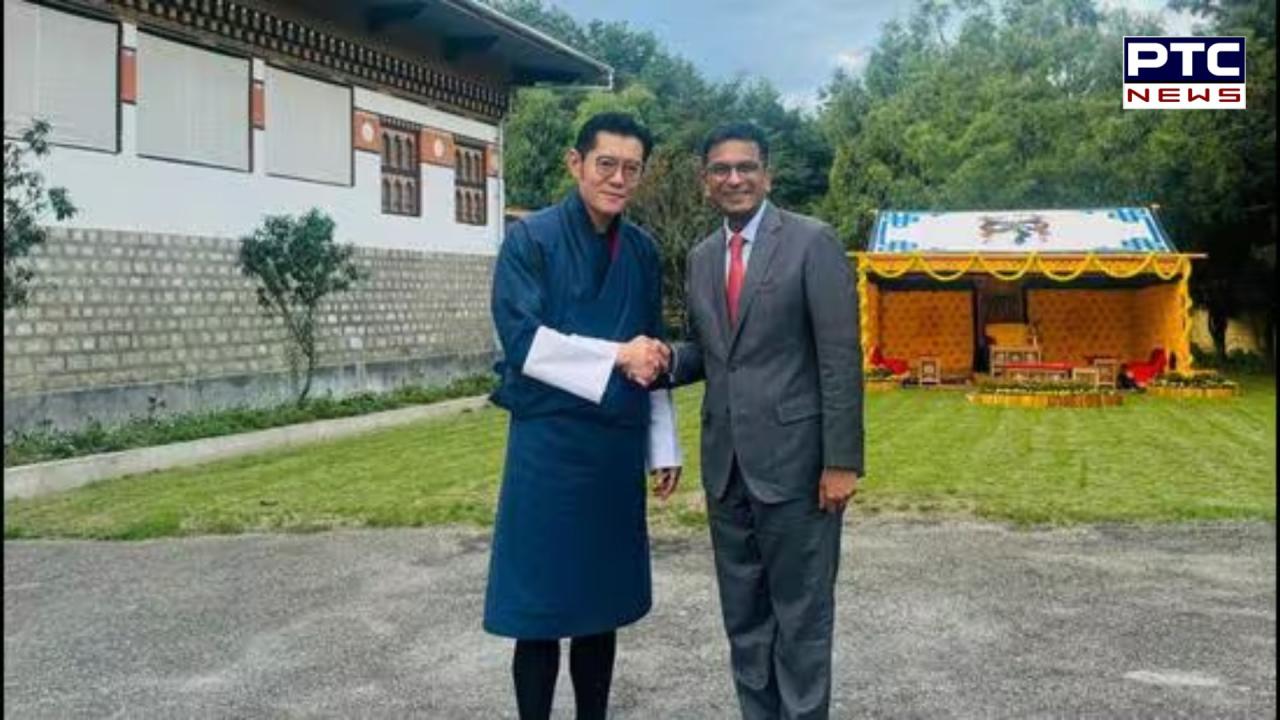- March 25, 2025
- Updated 2:22 am
CJI reflects on two-year tenure: ‘I gave my fullest every day’ as retirement approaches
PTC News Desk: As Chief Justice of India (CJI) Dhananjaya Y Chandrachud approaches his retirement next month, he has expressed a deep sense of fulfillment while reflecting on his two-year tenure at the helm of India’s judiciary. Speaking at the convocation ceremony of the JSW School of Law in Bhutan on Tuesday evening, Justice Chandrachud shared his commitment to his role, stating, “Over the last two years, I have woken up every morning with a commitment to give the job my fullest and gone to bed with the satisfaction that I served my country with utmost dedication.”
Justice Chandrachud assumed office as CJI on November 9, 2022, and is set to demit office on November 10, marking a significant period in the Indian judicial system. During his convocation address, he candidly addressed the anxieties that often accompany such a prominent position, reflecting on the questions that have occupied his thoughts as he nears the end of his tenure. He acknowledged concerns regarding his legacy and how history will perceive his contributions to the judiciary.
Addressing the graduates and dignitaries, which included Bhutan’s Princess Sonam Dechan Wangchuck and Chief Justice Lyonpo Chogyal Dago Rigdzin, Justice Chandrachud underscored the importance of self-reflection and personal growth. He remarked, “The answers to most of these questions lie beyond my control.” However, he found solace in the knowledge that he consistently gave his best effort, regardless of the eventual outcomes. He encouraged the graduates to focus on the journey rather than merely the destination, urging them to prioritize purpose over ambition.
In his address, Justice Chandrachud also touched on the significance of cultural preservation and environmental stewardship, exploring the interplay between modernity and tradition. He urged the audience to recognize and honor the traditional values that form the foundation of societies like India and Bhutan, stating that these values do not contradict democratic ideals but instead enhance them. He noted, “There is often a misconceived perception that the traditional values of our communities are antithetical to modern democratic ideas such as liberty, equality, and dissent.”
Drawing inspiration from Nobel laureate Dr. Amartya Sen, he highlighted India’s rich legacy of public debate, intellectual pluralism, and community-based dispute resolution. He suggested that these elements can significantly enrich and strengthen modern governance, fostering a more robust democratic environment.
Justice Chandrachud also commended Bhutan’s commitment to environmental protection, pointing out that the country’s constitution enshrines the principle of environmental stewardship as a fundamental duty. He praised Bhutan’s dedication to sustainability and emphasized the importance of training environmentally conscious legal professionals, particularly noting that the JSW School of Law’s upcoming LLM program in Climate Change and Environmental Law will play a vital role in this endeavour.
“What better place to study climate change and environmental law than a carbon-negative country that has lived and breathed the values of sustainability and environmentalism since its inception?” remarked the CJI, highlighting the urgent need for India to adopt similar commitments as it faces a climate crisis exacerbated by rapid economic growth.
As he addressed the young graduates, Justice Chandrachud encouraged them to use the law as a tool for positive change, extending beyond the narrow confines of litigation. Reflecting on iconic global struggles, such as the fight against apartheid and the civil rights movement, he emphasised the role of passionate, principled individuals in challenging injustice.
“The law possesses immense potential as a vehicle for transformative societal change,” stated the CJI. He inspired the students to remember the idealism of their youth and to channel it in service of others, quoting the renowned author Toni Morrison: “If you have some power, then your job is to empower somebody else.”
As his tenure comes to a close, Justice Chandrachud’s reflections serve as a testament to his commitment to justice, personal growth, and the importance of nurturing the next generation of legal professionals.
Also Read: RBI Monetary Policy: Will interest rates shift today? Experts weigh in
Recent Posts
- Crown of goddess Kali, gifted by PM Modi, stolen from temple in Bangladesh
- Hezbollah leader survives assassination attempt amid Israeli strikes that kill 22 in Beirut
- ਕ੍ਰਿਕਟ ਦੇ ਬਦਲੇ ਨਿਯਮ, ਹੁਣ ਇਸ ਕੇਸ ‘ਚ ਦੁਬਾਰਾ ਨਹੀਂ ਮਿਲੇਗੀ ਬੈਟਿੰਗ, ਮੰਨਿਆ ਜਾਵੇਗਾ
- ਸਚਿਨ ਤੇਂਦੁਲਕਰ ਦੇ ਬਰਾਬਰ ਪਹੁੰਚੇ ਜੋ ਰੂਟ, ਪਰ ਵਿਰਾਟ ਦੇ ਇਸ ਰਿਕਾਰਡ ਤੋਂ ਅਜੇ ਵੀ ਦੂਰ
- Ratan tata death: ਸਿਰਫ ਵੋਲਟਾਸ ਹੀ ਨਹੀਂ, ਸਵੇਰ ਤੋਂ ਰਾਤ ਤੱਕ ਤੁਹਾਡਾ ਕੰਮ ਟਾਟਾ ਦੇ ਬਿਨਾਂ ਨਹੀਂ ਚੱਲ ਸਕਦਾ
